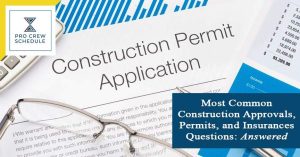One of the most common misconceptions in project management for construction is that it revolves solely around the operations aspects— well, that is only the tip of the iceberg. Before any work begins in a project, plans need to be approved, permits must be processed, and specific licenses and insurances must be acquired.
While this all may sound administrative and extensive, these are the things that have been constant in a project for decades. Some detail may be amended, but you and your team will need to go through this process every time you are awarded a project.
Why are Approvals, Permits, and Licenses Important in Construction?
Most construction developments need several plans and permit approval before work can begin, and acquiring them takes lots of time. If you’re managing a construction project, you may be overwhelmed with the amount of paperwork headed your way.
The types of licenses and insurances that contractors need, on the other hand, usually vary by location, but most construction projects will at least require a building permit. Construction permits and contractor licenses can also show prospective clients that your firm is qualified to handle the job in compliance with local or national building regulations and can keep you from getting fines that impact can make your bottom line.
Most of the time, construction companies and contractors are required to obtain building permits from local authorities before starting new projects. In some cases, they may also need to be licensed.
When are Licenses Required in Managing Construction Projects?
If you’re only a start-up construction or contracting company, you will need to apply for a business license. Whether you need additional specialized contractor licenses depends on local and state laws and the type of construction projects you work on.
For instance, California mandates all contractors who renovate and build structures be licensed with the state if the overall construction cost exceeds $500. New York requires home-improvement businesses to carry a license in certain cities.
While some states ask for only the general requirements, your company might need other licenses relative to your specialty. Electricians, roofers, drywallers, and other specialized companies may need to acquire licenses from respective industry associations. Many licensing authorities will require you to pay processing fees and pass exams to earn certification.
While not all states and specialized industries require construction professionals to be licensed since it isn’t mandatory, it still offers benefits. Having a professional license or certification could give you an edge over the competition, and some big-time clients may only work with licensed construction contractors and companies.
Lastly, in some states, construction licenses can help you collect incurred damages if a client fails to pay you for your work.
What is the Difference Between Planning Approvals and Permit Acquisition?
Planning approvals and permits are needed before a construction project can proceed, but these two have vastly different aims.
Permitting concerns building compliance with codes and safety requirements, while the plans approval process assesses a proposed structure’s impact on the community and the local jurisdiction’s master plan.
In a nutshell, a permit is a permission to build, contingent on compliance with local and sometimes national building codes. Building officials use the submitted project’s drawings and specifications to assess its code compliance.
Approvals, on the contrary, are issued to construction projects that meet land use and zoning standards. Depending on the building’s type and location, a project may need pre-approval from various local agencies, such as coastal committees and historic preservation, public works, health, transit, and fire authorities.
When Do You Need Approvals for Your Project?
Yes, your construction project will need approvals most often than not. Establishing which specific approvals are required is the first step to getting your project authorized.
Small residential projects are typically required to satisfy local zoning ordinances to get approval. These cover the building’s land use, appearance, and size and include the following:
- Land Use – the structure you intend to construct must comply with land use prescribed for its assigned zone or qualify for a variance.
- Building Setbacks – this refers to the distance between the property line and the building’s exterior
- Appearance – many localities demand that your building and its landscaping conform to the neighborhood’s character and general city standards.
- Height – most local jurisdictions specify the maximum building height limits for various zones.
- Parking – many locals require a certain number of parking spaces for your development, especially if it is a high-rise residential structure
Larger, commercial, residential, and industrial developments may be required to conform with other building codes that can keep track of the project’s community impact. For example:
- Coastal Commission – if your construction project is positioned in a coastal zone, the State’s Coastal Commission will have to review your project technicalities before issuing a Coastal Development Permit. With certain exceptions, all construction activities within these coastal zones need a Coastal Development Permit.
- Historical Preservation – does your project involve altering a heritage building? The historical preservation commission will check your construction plans to ensure that your design intent will align with their vision.
And there are other approvals you may require before your project can proceed. While it can feel overwhelming since schedules might overlap with all the permits needed to process, reliable construction scheduling software can help make this endeavor much more manageable.
How Can I Get Approvals for my Construction Projects?
On a minor residential project, a small construction firm or contractor should be able to navigate through the approvals process just fine. Larger, more complex developments would need the help of a construction company or firm in preparing the submittals and applications.
The approval process per jurisdiction typically starts with a pre-application consultation at their respective local planning department. The staff will assess your project and identify all the commissions and committees it must go through before all the required permits and approvals can be issued.
Once this preliminary meeting is one, you will have the chance to present your submittal. After submitting the required documents, your application will circulate through some of the committees we’ve discussed above and appear before a public meeting. The project may also need to go through an environmental review.
If some of the reviewers are not satisfied with your submittal, you’ll get comments and have to revise some documents or re-submit your application. The cycle will continue until your construction project meets all the relevant requirements.
Do My Construction Projects Need Permits?
With project approvals in your hands, you’ll feel you’ve won an uphill battle. However, the truth is you’re only halfway there. Your construction project must still convince the building officials and local authorized bodies that it’s safe, and you may need to acquire various kinds of permits before shovels can hit the dirt in your project.
Depending on the building type, occupancy, location, and size, you may need a permit for any of the activities below:
- Grading – removal, backfill, re-compaction,
- Building – includes new construction, alteration, addition, and demolition
- Electrical Work
- Mechanical Work
- Plumbing
- Elevators
- Fire sprinklers – any installation or modification of a sprinkler system
- Green Building – most new construction, alteration, and addition projects are subject to review if they comply with the Green Building Standards Code of the respective local jurisdiction.
The local building department should tell you which of these permits you will need before starting with your project.
How Can I Acquire Permits for My Project?
Typically, the set of plans required for a construction project permit comprises the following:
- Site Development Plan
- Grading and Sloping Plan
- Mechanical, Electrical, and Plumbing Plans
- Building Elevation Plans
- Floor Plan
- Plans for any other permitted activity
- All pre-requisite approvals you’ve already obtained
Once submitted, your submitted plans go through plan reviews. You can expect many feedback cycles, adjustments, revisions, and re-submittal before all your permits are issued.
What are the Additional Construction Insurances and Bonds You Should Know of?
Having the appropriate licenses and permits shows that you run a reputable business. Buying insurance and bonds reassures customers that they won’t be held liable for damages incurred if something goes wrong during project operations. Construction companies and contractors usually purchase the following policies, and some clients will demand that you have them before they hire you for a project:
a. General Liability Insurance
General liability insurance is a vital must-have in a risky industry such as construction. General liability insurance covers your company if a visitor suffers an injury or accident at a construction site or if you damage a client’s property.
b. Professional Liability Insurance
Aka the errors and omissions insurance, professional liability insurance will help you pay for the costs of a lawsuit if a project owner sues you over a construction defect.
c. Workers’ Compensation Insurance
A construction site is a minefield of potential hazards, and worker accidents can happen at any time. Most localities require construction companies and contractors – even those without employees – to obtain workers’ compensation insurance to pay for injured employees’ medical bills and reimburse them for any lost wages. Having this insurance also reinforces a company’s construction crew management and encourages more workers to sign job offers if this is included in the work package.
d. Contractor’s Equipment and Tools Insurance
Most construction companies depend on costly equipment, and construction tools and equipment insurance reimburse you for anything that is stolen, lost, or damaged.
e. Commercial Auto Insurance
Construction companies that have their vehicles will want to purchase a commercial auto policy to cover any potential damage from accidents.
f. Surety Bonds
Lastly, surety bonds protect government authorities that issue building permits and are usually required for construction projects. Surety bonds ensure that your company will pay financial damages to these government agencies if a third party sues them over your work.
Key Takeaway
As you go through all these administrative tasks for your project to come to reality, you might feel intimated by everything you have to check off your to-do lists. However, there are digital solutions available at your disposal to make it more controllable, organized, and even enjoyable.
Pro Crew Schedule, an online inventory software, can help you layout the schedule of your submittals, delegate the workload to your team, store documents and other files online, and get revisions and approvals from needed stakeholders anytime, anywhere.
Start with the 30-day free trial today.







